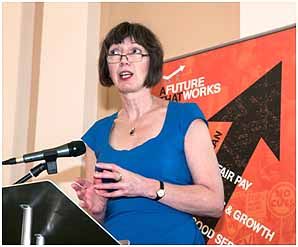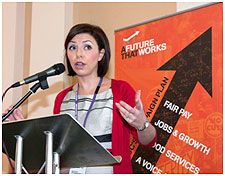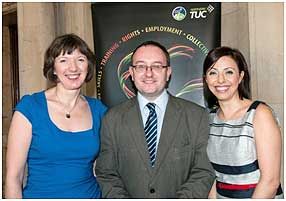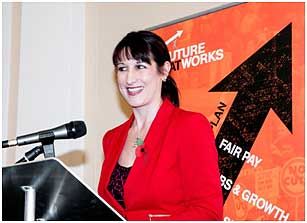Living Wage Summit comes to South Tyneside
Over 80 people attended the TUC’s Northern Wage Summit which took place at South Shields Town Hall on Thursday 7th November. The event was organised to take place during Living Wage Week and brought together public, private, voluntary and community organisations and trade unions to collectively discuss and debate the case for a living wage. The day coincided with Equal Pay Day, a day designated to highlight that four decades on from the Equal Pay Act, working women still earn almost £5,000 a year less than their male counterparts [see TUC release and TUC blog]
There was an impressive line up of speakers including Frances O’Grady, TUC General Secretary and Rachel Reeves MP, Shadow Secretary of State for Work and Pensions. There were also contributions from employer organisations, speakers on financial inclusion, child poverty, the living wage foundation and local MP for South Shields, Emma Lewell-Buck.
 Fair Pay is a key priority for the TUC and in her comments Frances O’Grady said that across the polls the singular most popular policy of the conference season was Ed Miliband’s promise to freeze energy prices. Much of the debate on living standards to date has focused on rising prices. But the real story of why people are feeling the pinch isn’t so much about price inflation, it’s about a real wages crash. She went on to say that where companies can pay more there is no justification for not paying a living wage. There is a growing gap between those at the top of the wages ladder and those at the bottom with 8 in 10 jobs created in low pay industries which pay £8 or less per hour, a spread of zero hours contracts, part time workers who cannot get full time jobs and five million workers earning less than a living wage (in our region 1 in 3 workers are paid less than the living wage, currently set at £7.65). She would like to see a return to the rate for the job. There is also the heavy human cost associated with low pay, more likely to be shouldered by women, black and ethnic minority workers and the young. She stressed that the economy is there to serve society – not the other way around. There needs to be a very clear commitment from the government that they will restore the minimum wage and will crack down on rogue bosses. We need to step up the campaign for a living wage, following the lead of Councils like Carlisle and Middlesbrough. We need to get back to collective bargaining, create new wages councils and provide protection for workers. We need to make sure that workers in Britain and especially in this region get the pay rise they deserve. [a copy of the TUC’s campaign plan can be downloaded from http://www.tuc.org.uk/tuc-campaign-plan. Hard copy available from the TUC regional office – telephone 0191 232 3175].
Fair Pay is a key priority for the TUC and in her comments Frances O’Grady said that across the polls the singular most popular policy of the conference season was Ed Miliband’s promise to freeze energy prices. Much of the debate on living standards to date has focused on rising prices. But the real story of why people are feeling the pinch isn’t so much about price inflation, it’s about a real wages crash. She went on to say that where companies can pay more there is no justification for not paying a living wage. There is a growing gap between those at the top of the wages ladder and those at the bottom with 8 in 10 jobs created in low pay industries which pay £8 or less per hour, a spread of zero hours contracts, part time workers who cannot get full time jobs and five million workers earning less than a living wage (in our region 1 in 3 workers are paid less than the living wage, currently set at £7.65). She would like to see a return to the rate for the job. There is also the heavy human cost associated with low pay, more likely to be shouldered by women, black and ethnic minority workers and the young. She stressed that the economy is there to serve society – not the other way around. There needs to be a very clear commitment from the government that they will restore the minimum wage and will crack down on rogue bosses. We need to step up the campaign for a living wage, following the lead of Councils like Carlisle and Middlesbrough. We need to get back to collective bargaining, create new wages councils and provide protection for workers. We need to make sure that workers in Britain and especially in this region get the pay rise they deserve. [a copy of the TUC’s campaign plan can be downloaded from http://www.tuc.org.uk/tuc-campaign-plan. Hard copy available from the TUC regional office – telephone 0191 232 3175].
The causes and effects of debt in the North East were clearly outlined by Alison Baxter of FINCAN. The causes of debt can be triggered by a change in circumstances (e.g. losing your job, relationship breakdown, irresponsible lending) and the effects on individuals and families can cause stress, anxiety and depression which can lead to isolation and social exclusion, sickness absence and less productivity. In the North East 34p in every £1 gross income is debt and the average household debt is £6,000. The Northern TUC is working closely with FINCAN to encourage Councils and other employers to sign up to the Fair Finance pledge and work with trade unions and financial institutions to make the North East a better place for people to manage their money. [Download Alison's presentation]
Prior to lunch groups were asked to consider the following questions and report back on discussion.
Q1 – what are the full consequences of low wages?
- Domestic and social impact – people leaving the region to find better paid employment, drain on resources, poor education attainment and low aspirations.
Q2 – what would be gained by lifting low pay?
- Local economic regeneration – greater disposable income, spending will be in the locality, increased spending power, health benefits – people don’t need to take on multiple jobs tomake ends meet, ability to make better choices, work-life balance.
Q3 – how could you, in your role, promote the living wage and fair pay?
- Linking with community groups, provide case studies, raise awareness. Showcase where it has been effective, look at procurement strategies, compare who is paying living wage. Campaign – it’s what trade unions are effective at.
Q4 – what tools and resources do you need to support this?
- Toolkits, bringing together information from multiple sources, train own negotiators, effective communication practices, use media more effectively.

Beth Farhat [left], TUC Regional Secretary and Chair of today’s Summit, introduced the afternoon speakers: Sarah Vero from the Living Wage Campaign, Steve Crossley, Institute for Local Governance, Neil Foster from the TUC and Rachel Reeves MP, Shadow Work and Pensions Secretary.
In her presentation Sarah Vero set out how the living wage was calculated and what is meant by a living wage, the history and origins of the campaign from its launch in 2001 to the creation of the Living Wage Foundation in 2011. She highlighted some pertinent facts and figures including: 80% of employers believe that the living wage had enhanced the quality of work of their staff, reporting improved loyalty and customer service, lower absenteeism and improved retention rates and reduced HR costs. She also explained how the accreditation process worked citing there are currently 430 accredited employers paying the living wage with around 200 in the pipeline. [Download Sarah's presentation].
In a country where 66% of children growing up in poverty live in working households, Steve Crossley asked ‘does the North East really want to be a region that sets a living wage below everyone else.’ In the North East 128,405 children are living in poverty with the highest number in Middlesbrough (11,055) with South Tyneside not far behind at 8,110. The consequences of poverty are wide ranging and the poorest infants have an almost 10 times higher chance of dying suddenly in infancy than those in the highest income group. Work is no longer a secure route out of poverty for many people. The focus in tackling poverty should shift from the perceived and un-evidenced behavioural short-comings of job-seekers to the behaviours of employers and commissioners offering low-paid, insecure, poor quality work. [Download Steve's presentation].

Neil Foster [pictured with Frances O’Grady, left and Beth Farhat, right] presented the economic case for fair pay, citing it is no coincidence Wonga chose Newcastle United to sponsor. He stressed the importance of public sector contracts in our economy, with £3.5bn public contracts in the North East alone, it’s a huge market. We need more and better jobs and we need to be mindful of the wages of jobs that are created in our region. We need to look at how we can use procurement to ensure contracts are given locally. Research conducted by Unison in 2011 revealed that 84% of the lowest paid public sector workers outside of London live in the same area that employs them with 74% of people in employment saying they would be more likely to buy products or services from a Living Wage employer. Regenerate people’s incomes and we’ll regenerate place. [Download Neil's presentation].

In welcoming Rachel Reeves, Beth Farhat commended her for her efforts in defeating regional pay and for being instrumental in championing the inclusion of the living wage as part of Labour’s manifesto. Rachel commented that with prices rising faster than wages, the government has no comprehension of what it’s like to be reliant on benefits to be able to make ends meet. Everyone should benefit from economic growth, we all deserve to share in its rewards – it’s not much to ask. Someone has to pay the bills. It’s a shocking indictment of this government’s lack of policy that the cleaners in Whitehall are not being paid a living wage. All large companies should be made to publish their rates of pay of their employees and a commitment to pay the living wage should be included in contracts of employment and procurement tenders. With over 400 firms already accredited as living wage employers it’s up to us as consumers to decide where we spend our money and incentivise more organisations to follow. Experts at Landman Economics calculate the Treasury would pay out £46.2m less in means-tested benefits and be handed an extra £92.4m from extra tax and National Insurance contributions if a North East-wide living wage was introduced.
The Chair thanked Rachel for her comments and introduced the panel session which was chaired by Gill Hale, Chair of the Northern TUC. Questions were submitted in advance of the Summit and the Panel of Chris Jukes, GMB, James Ramsbotham, NECC, Jo Curry, VONNE and Ian Lavery MP for Wansbeck were asked to respond.
Q1 – why does the panel think the North East has become a low-pay region and what do they think needs to happen to change that?
- Loss of heavy industry contributed to the loss of skills, no proper apprenticeships and heavy reliance on public sector. There should be an emphasis on creating more public sector jobs, not cutting them. We have got to raise people’s aspirations to increase their skills base. The NECC has produced ’50 great reasons to work in the North East’ which is available to download from their website http://www.necc.co.uk/about-necc-and-region/regional-image-portal/82-regional-information-and-resources/1389-necc-presentation-50-great-reasons-to-do-business-in-the-north-east
- Investing in public infrastructure projects such as the A1, A66 would bring jobs and income.
Q2 – How can we persuade more North East employers to pay the living wage and can the panel suggest any practical steps?
- Raise awareness and provide evidence of the economic and social benefits of paying the living wage (case studies, research etc). Embed the living wage in procurement practices, national pay structure; offer tax incentives and work with employers to get better value.
Q3 – Shouldn’t the national minimum wage just become a national living wage?
- The Panel felt they should be kept separate as they are quite different.
Q4 – Given that the North East has the highest child poverty rates, the lowest wages and the most Labour-run councils in the country, why aren’t more council leaders in our region stepping up and backing a living wage?
- The Panel felt that more Councils should be backing a living wage and there needs to be a greater understanding of the effects of poverty in their local areas.
 Our final speaker of the day was Emma Lewell-Buck, MP for South Shields, who was thankful that when starting employment she was able to benefit from the national minimum wage. At that time there was a lot of scaremongering that introducing a NMW would cost jobs and employers would reduce hours to enable them to match the demands of a Minimum Wage, fears which never materialised. What did happen is that people felt more valued and respected and the Tories were proved wrong. The Minimum Wage is currently £6.31. If it had risen in line with the wages of the top one per cent then the Minimum Wage would now be £19 per hour. The next Labour government will do all we can to promote the living wage, and make sure employers do the responsible thing and pay their workers fairly. To see Emma’s full speech go to http://www.southshieldslabour.org.uk/emma_celebrates_living_wage_week
Our final speaker of the day was Emma Lewell-Buck, MP for South Shields, who was thankful that when starting employment she was able to benefit from the national minimum wage. At that time there was a lot of scaremongering that introducing a NMW would cost jobs and employers would reduce hours to enable them to match the demands of a Minimum Wage, fears which never materialised. What did happen is that people felt more valued and respected and the Tories were proved wrong. The Minimum Wage is currently £6.31. If it had risen in line with the wages of the top one per cent then the Minimum Wage would now be £19 per hour. The next Labour government will do all we can to promote the living wage, and make sure employers do the responsible thing and pay their workers fairly. To see Emma’s full speech go to http://www.southshieldslabour.org.uk/emma_celebrates_living_wage_week
The Chair closed the event saying the TUC is delighted that Ed Miliband is backing a living wage and that so many MPs in our region are actively supporting it too. She thanked speakers and attendees for their contributions and looked forward to working with all our partners to make the North East a Fair Pay region.
The event generated good media coverage including:
Interview with Frances O’Grady and report of the event in the Shields Gazette
- http://www.shieldsgazette.com/news/britain-needs-a-pay-rise-tuc-boss-tells-south-shields-summit-1-6225248
- http://www.shieldsgazette.com/news/business/campaign-calls-for-higher-wages-1-6227660
and reports in the Journal and Chronicle newspapers:
- http://www.thejournal.co.uk/news/north-east-news/councils-urged-adopt-living-wage-6283756
- http://www.thejournal.co.uk/news/north-east-news/ed-milibands-living-wage-calls-6275396
- http://www.thejournal.co.uk/news/north-east-news/newcastle-city-council-plans-boost-6287692
- http://www.chroniclelive.co.uk/news/north-easts-councils-called-set-6284475
Stay Updated
Want to hear about our latest news and blogs?
Sign up now to get it straight to your inbox
